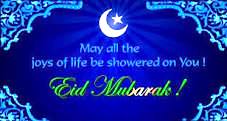During this month it is obligatory for all believers to fast from dawn to dusk, which means they cannot even drink water. Id is celebrated on the first day of the new moon in Shawwal, which is the month following Ramzan. Every man must go to the mosque on Id  for a special prayer service or namaz. Id-ul-Fitr means”festival of breaking the fast”. This festival marks the end of the month of fasting that characterizes the ninth month of Ramzan in the Islamic calendar. Women generally offer namaz at home. Childrem gets gifts on occasion known as Idi. New or clean clothes (usually white as it symbolizes purity and simplicity) are worn and everybody greats one another. It is also the time to forget past grievances. Id is celebrated to thank the Almighty for having revealed the Quean in the month of Ramzan for the guidance of mankind.
for a special prayer service or namaz. Id-ul-Fitr means”festival of breaking the fast”. This festival marks the end of the month of fasting that characterizes the ninth month of Ramzan in the Islamic calendar. Women generally offer namaz at home. Childrem gets gifts on occasion known as Idi. New or clean clothes (usually white as it symbolizes purity and simplicity) are worn and everybody greats one another. It is also the time to forget past grievances. Id is celebrated to thank the Almighty for having revealed the Quean in the month of Ramzan for the guidance of mankind.
Id is also a time for giving. A special contribution called zakat is made for the less fortunate, whether relatives or other. The zakat is certain percentage of the value of the giver’s wealth. Id is celebrated across India and the Islamic world with great enthusiasm. Id cuisine is enjoyed and loved by people of all communities. The kababs,biryani (specially flavored rice cooked with meat),malpuya,seaiyan(vermicelli) are only amongst a few of the delicacies that fill the streets during the entire month of Ramzan and Id. Apart from Id-ul-Fitr, Id-ul-Zuhat, also known as Bakr-Id in India, is widely celebrated. The word ‘bakri’ means goat and the festival gets its name from ritual sacrifice of the goat. Prayer meetings and Id milans are part of the celebration as well.
